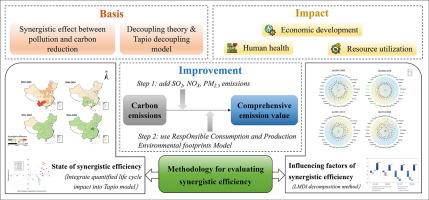探索大气污染与碳减排的协同效应及其影响因素:来自中国的启示
IF 11.2
1区 环境科学与生态学
Q1 ENGINEERING, ENVIRONMENTAL
引用次数: 0
摘要
高效的协同减排可以有效缓解环境改善和经济发展的双重压力。揭示协同减排与经济发展之间的关系可以指导政策的科学制定。然而,目前缺乏全面评估多种污染物和经济因素协同效应的方法。本研究采用生命周期评估模型来量化空气污染物和二氧化碳的综合影响。它引入了协同效应的创新概念,并建立了一个普遍适用的评估框架。中国的案例研究表明,自 2013 年以来,协同效率得到了提高。提高能源效率和推进绿色技术是提升协同效率的关键。产业结构调整既是机遇也是挑战,需要政策制定者考虑其波动性。本方法建议可作为其他国家评估协同效率的有力工具,使其能够制定科学合理的政策,促进可持续发展。本文章由计算机程序翻译,如有差异,请以英文原文为准。

Exploring synergistic efficiency of air pollution and carbon reduction and its influencing factors: Insights from China
Efficient synergistic emission reduction can effectively alleviate the dual pressures of environmental improvement and economic development. Revealing the relationship between synergistic reduction and economic development can guide the scientific formulation of policies. However, current methodologies are lacking in comprehensively assessing synergistic effect of multiple pollutants and economic factors. This study employs a life cycle assessment model to quantify the comprehensive impacts of air pollutants and CO2. It introduces an innovative concept of synergistic efficiency and establishes a universally applicable evaluation framework. The case study in China demonstrates that synergistic efficiency has been improved since 2013. Enhancing energy efficiency and advancing green technologies are pivotal for boosting synergistic efficiency. Adjustments in industrial structures present both opportunities and challenges, requiring policymakers to consider the fluctuation. This proposed methodology serves as a robust tool for other countries to assess synergistic efficiency, enabling them to develop scientifically informed policies that foster sustainable development.
求助全文
通过发布文献求助,成功后即可免费获取论文全文。
去求助
来源期刊

Resources Conservation and Recycling
环境科学-工程:环境
CiteScore
22.90
自引率
6.10%
发文量
625
审稿时长
23 days
期刊介绍:
The journal Resources, Conservation & Recycling welcomes contributions from research, which consider sustainable management and conservation of resources. The journal prioritizes understanding the transformation processes crucial for transitioning toward more sustainable production and consumption systems. It highlights technological, economic, institutional, and policy aspects related to specific resource management practices such as conservation, recycling, and resource substitution, as well as broader strategies like improving resource productivity and restructuring production and consumption patterns.
Contributions may address regional, national, or international scales and can range from individual resources or technologies to entire sectors or systems. Authors are encouraged to explore scientific and methodological issues alongside practical, environmental, and economic implications. However, manuscripts focusing solely on laboratory experiments without discussing their broader implications will not be considered for publication in the journal.
 求助内容:
求助内容: 应助结果提醒方式:
应助结果提醒方式:


